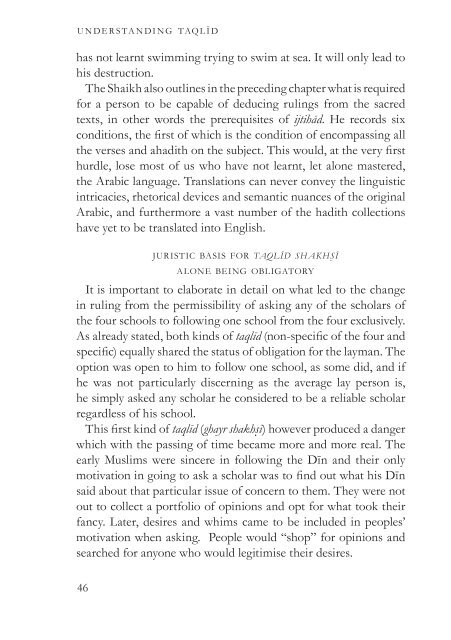Understanding Taqlid by Mufti Muhammad Sajaad
http://www.islamicglobe.com
http://www.islamicglobe.com
Create successful ePaper yourself
Turn your PDF publications into a flip-book with our unique Google optimized e-Paper software.
understanding taqlīd<br />
has not learnt swimming trying to swim at sea. It will only lead to<br />
his destruction.<br />
The Shaikh also outlines in the preceding chapter what is required<br />
for a person to be capable of deducing rulings from the sacred<br />
texts, in other words the prerequisites of ijtihād. He records six<br />
conditions, the first of which is the condition of encompassing all<br />
the verses and ahadith on the subject. This would, at the very first<br />
hurdle, lose most of us who have not learnt, let alone mastered,<br />
the Arabic language. Translations can never convey the linguistic<br />
intricacies, rhetorical devices and semantic nuances of the original<br />
Arabic, and furthermore a vast number of the hadith collections<br />
have yet to be translated into English.<br />
juristic basis for taqlīd shakhṣī<br />
alone being obligatory<br />
It is important to elaborate in detail on what led to the change<br />
in ruling from the permissibility of asking any of the scholars of<br />
the four schools to following one school from the four exclusively.<br />
As already stated, both kinds of taqlīd (non-specific of the four and<br />
specific) equally shared the status of obligation for the layman. The<br />
option was open to him to follow one school, as some did, and if<br />
he was not particularly discerning as the average lay person is,<br />
he simply asked any scholar he considered to be a reliable scholar<br />
regardless of his school.<br />
This first kind of taqlīd (ghayr shakhṣī) however produced a danger<br />
which with the passing of time became more and more real. The<br />
early Muslims were sincere in following the Dīn and their only<br />
motivation in going to ask a scholar was to find out what his Dīn<br />
said about that particular issue of concern to them. They were not<br />
out to collect a portfolio of opinions and opt for what took their<br />
fancy. Later, desires and whims came to be included in peoples’<br />
motivation when asking. People would “shop” for opinions and<br />
searched for anyone who would legitimise their desires.<br />
46














